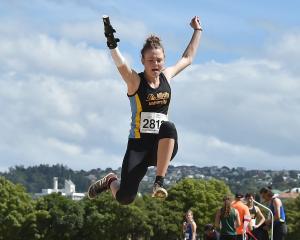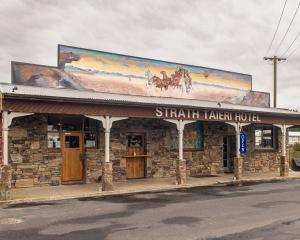Tattooing is far more accepted now than when Chris Downing started his work in Dunedin in the late ’90s.
"In the old days you used to go into a shop and a [look at a] little tattoo flash, sheets with tattoos and their prices on it," he remembers.
"It was so cool. I want those days back."
Mr Downing works solo out of his studio in the Octagon called Crazy Horse. He’s one of the most experienced artists left in the city; his shop is the oldest.

"Since then I’ve seen about 20 to 25 shops come and go," he said.
Now tattoo studios were "stacking up on each other," but Mr Downing remembers when there was a lot of animosity about patches of town.
"It was almost an out and out war."
The art has become a lot safer since those days, too.
"There was no sterilisation really, at the start. So everyone was ... no gloves, one rag for the day.
"Scoop of vaseline and everyone got the same stick and there was blood on it."

He shrugs his shoulders.
"I’ve been tattooed like that ... it’s disgusting.
"But that’s how the culture was and that’s what it is."
With tattoos going from an anti-society symbol to mainstream popularity, the art has been watered down, Mr Downing said.
"It’s a weird thing, in respect to how it’s evolving.
"It’s a real free-for-all now. They’re everywhere ... everywhere you look there’s a tattoo shop."

He was concerned about how easy it is for anyone to start tattooing. They can pick up a machine for $100 and "all of a sudden they’re a tattooist".
"There’s a lot of mistakes being being made with tattoo machines that can’t be fixed. There’s going to be a lot of people out there really sad when it comes down to it and go ‘oh shit I’ve got this mess on me, what do I do?’
"I see a lot of it in here getting fixed."
And sometimes it just cannot be fixed, Mr Downing said.
"Tattoo’s become the new guitar. At least if someone picks up a guitar, they can’t play it, they put it down [and] there’s no harm.
"They pick up a tattoo machine and start playing with that. There’s a lot of mess. [It’s] dangerous for health reasons, too."
When he started you needed to essentially work in a tattoo shop to access the right gear.
"It was a proper apprenticeship and you didn’t get there unless you were worthy."
Mr Downing credits his training to Greg Burt, "an old guy that taught me". Now he looks around Dunedin in awe at the range and number of artists in his field.
The names he rattles off as the stars of the local scene include Brendan Smith, Matt Wilson and Veronica Brett.

"You just put a leaf over it if you screw up," Veronica Brett from Agency Tattoos said, when asked about the pressure of getting someone’s tattoo wrong.
Fashion has changed tattooing, she says, and the need for fix-up jobs has increased.
"What was really popular two years ago people are coming in now and realising it was maybe a bit of a flash-in-the-pan trend. ‘Oh no, I’ve got the typical tattoo of 2018 and I want to cover it up with something more classic’."
She said she would try to steer people away from trends.
"What’s something that’s meaningful to you, or something that’s a bit more timeless?
"A lot of the time people go on Pinterest or something and search ‘cool tattoo for men’, ‘cool tattoo for women’."
Tribal armbands are now a classic fix-up job, which screams the ’90s when she sees them.
The irony for Chris Downing is those are the tattoos he was doing when he started out and now they are coming back to get altered.
Ms Brett said she liked tattooing as a profession; it paid well compared to most artist jobs.
"Tattoos aren’t cheap.
"It’s another reason they’ve almost become a bit more of a status symbol," she said, pointing out that someone covered in tattoos has also likely spent more than $10,000 and can be showing their wealth.
Mr Downing loves his job as a passion, an expression of art he is doing 24 hours a day.
"When you love your job, you don’t work."

"You’ve got to put your time in."
Matt Wilson runs Fineline Tattoo Collective in Princes St.
He is coming up to 10 years as an artist.
"I ... started how I would advise anybody not to start," he said.
That is, tattooing at home. Mr Wilson said a friend of his had just got out of jail and made him a homemade tattoo machine with a Bic pen, a needle and a spoon.
"I had done a few tattoos with this homemade machine ... it was the same sort of time I’d started my bachelor of visual arts degree. It all sort of twisted and happened ... and I got started in tattooing with ... Dan Wadsworth."
Mr Wilson took over the Kaikorai Valley shop after Mr Wadsworth died in a motorbike accident in 2011.
He ran it for about three years before moving on to his Fineline Tattoo Collective.
His favourite part of the job was the people he got to meet.
"You get to make artwork on people that lasts forever ... some of my best friends I’ve met through tattooing."
Mr Wilson has one client who has been seeing him for two hours every two weeks for about eight years.
"Complete coverage — he’s got his whole head done, his whole neck done, right down to his fingers," Mr Wilson said.
It was a highly stressful job, Mr Wilson said, and not in ways people thought.
The art itself was not the stressful part.
" ... it’s more the dealing with clients and going through the design process because that’s what people don’t see."
He says there is a lot of demand for the artists in Dunedin. Mr Wilson’s diary is booked up until March, but it is not uncommon to have it booked for longer periods.
Some artists may not be available for as long as a year, he said.
All of the artists agree the internet and social media have changed tattooing.
Back to Veronica Brett: "Sometimes it feels like people do tattoos for the photo, for the Instagram post."
Mr Downing said that is what modern tattooing was.
"It’s a real popstar kind of thing," Ms Brett said.
"There’s certain tattoo artists who are really famous who have all these millions of followers and get a bit of a celebrity status."
Social media can be good for artists; it spreads their profile and more people may be drawn in to get work done by them.
Ms Brett, however, will not be seeing those posts as she has deleted her Instagram accounts — preferring the artist-to-client relationship to be more human and less online.
Tattooing was not just about inking people’s skin. They list off the other things they do for people in the studio: therapist, barman and "professional shaver".
"I reckon I can shave a man’s entire leg with one disposable Bic," Ms Brett said.
A lot of clients come in for a tattoo during a very poignant time in their life; often they have lost someone close to them.
"It can be ... something they can do to feel like there’s some movement in that healing process of losing someone special," Ms Brett said.
It is a lot of pressure but Ms Brett said it is also an honour to be involved in that healing.
For Mr Downing, every client is different and wants to be treated differently.
"... and you have to work out very quickly who the hell they are and what they want.
"I had an Irish boy hassle me for three days — he was drunk every day. On the last day I said put your money on the table and I’ll tattoo you and if you f**k up, I’ll throw you out."
It turned out he was part of the Scots Guards "and he was on leave from Iraq. That boy, after I tattooed him, he broke down ...
"He was drunk because he was trying to forget what happened.
"I tattooed him because I felt I had to for whatever reason and then he broke down and told me that.
"Everyone has got something going on and you don’t even know what’s going on a lot of the time."
How mainstream tattooing is now is a big surprise to Mr Wilson.
"The amount of people that come in that might not have been tattooed ... that are getting tattooed now, all different kinds of people."
Another big change is the studios. They are open, light spaces now, he said.
"Ten years ago you go to a tattoo shop and ... it’s black, the windows are frosted and it looks like someone’s selling drugs out the back."
Mr Downing believed tattooing would not slow down in its popularity and usage, saying his children love to draw on themselves and were likely to be keen on tattoos.
Ms Brett and Mr Wilson were expecting the opposite — that the next generation would not find tattooing as endearing.
"It can’t keep spiralling up and up and up like the way it is," Mr Wilson said.
"Maybe with this next generation when they see their parents [and] everybody’s covered in tattoos [they’ll say] ‘well I don’t want to do that, because that’s what my mum looks like and I don’t want to do that."












